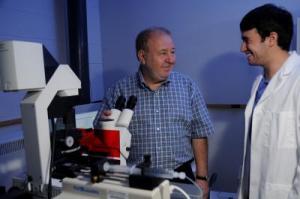Jan 24 2014
Dr. Yuri Lvov, professor of chemistry and T. Pipes Eminent Endowed Chair in Micro and Nanosystems at Louisiana Tech University's Institute for Micromanufacturing, has been selected to receive the prestigious Humboldt Research Award in chemistry, also known as the Humboldt Prize, by the Alexander von Humboldt Foundation in Germany.
 Dr. Yuri Lvov (left) works with a student at Louisiana Tech University. Credit: Louisiana Tech University
Dr. Yuri Lvov (left) works with a student at Louisiana Tech University. Credit: Louisiana Tech University
Annually, up to 100 Humboldt Prizes are awarded in all research and humanitarian fields with the chemistry prize going to only about six eminent chemists worldwide. Lvov received the award for his groundbreaking work in the chemistry of nano-scale systems and becomes one of the first scientists in Louisiana to receive the award for work in chemistry.
"The significance of Yuri's contributions to the field of chemistry and nanoscience are matched only by the impact he has had on the academic and research reputation of Louisiana Tech," said Louisiana Tech President Les Guice. "He provides our students with a unique opportunity to learn from and work side-by-side with one of the world's most respected research scientists, right here in northern Louisiana.
"I congratulate Yuri on this remarkable achievement and am proud that he continues to serve as a leading force for innovation and research excellence at Louisiana Tech."
The Humboldt Prize is conferred upon internationally renowned scientists in recognition of lifetime achievements in research. It also recognizes those whose fundamental discoveries or insights have had a significant impact on their own discipline and who are expected to continue producing cutting-edge innovations in the future. Award winners are invited to spend a period of up to one year cooperating on a long-term research project with specialist colleagues at a research institution in Germany.
Dr. Stan Napper, vice president for research and development at Louisiana Tech, said the award is international recognition for Lvov and for Louisiana Tech University.
"Dr. Lvov joins a select group of Fellows around the world who have been recognized for fundamental discoveries and ongoing research by the von Humboldt Foundation," said Napper. "His expertise in nanotechnology and nanoscience is recognized around the world, and we are so pleased that he has chosen to share his knowledge and his inquiry with students and faculty at Louisiana Tech. His presence and professionalism have helped elevate our university and our state."
Lvov's scientific papers have been cited more than 12,000 times, making him one of the most highly cited chemists in the world today. He is also the author of more than 250 peer reviewed publications and has been invited to present talks at more than 120 national or international scientific conferences and lectures, at over 50 major universities and companies. Small Times Magazine named Lvov its 2007 Innovator of the Year and, in 2013, he was elected as an honorable professor at Beijing University of Chemical Technology in China.
"This is a great and well deserved honor for Dr. Lvov and Louisiana Tech is fortunate to have internationally recognized faculty like him," says Dr. Hisham Hegab, interim dean of Tech's College of Engineering and Science. "He has been our chief scientist in nanotechnology for many years and has continued to develop innovative research in nanotechnology such as his groundbreaking work in clay nanotubes. The College continues to benefit greatly from his dedication to undergraduate and graduate education as well as his basic and applied research that is leading to commercial applications."
Lvov was nominated by for the Humboldt Prize by Technical University of Berlin – the largest engineering school in Germany – where he collaborates with Professor R. von Klitzing on fundamental problems related to the new type of ceramic nanotubes for composite materials. Lvov has pioneered two important nanotechnology methods: an electrostatic layer-by-layer nanoassembly and clay nanotubes for functional polymer composites. Researchers from around the world have followed his innovative research techniques.